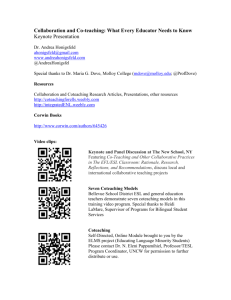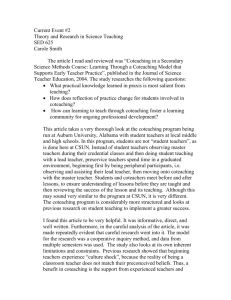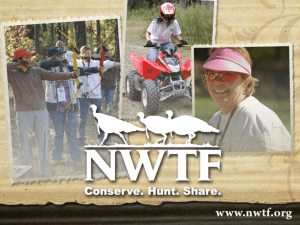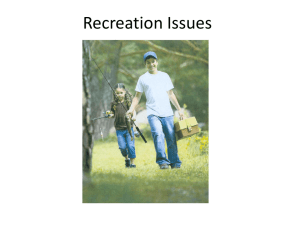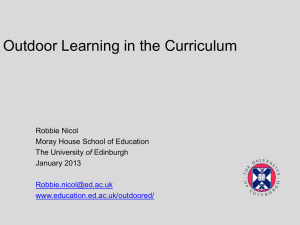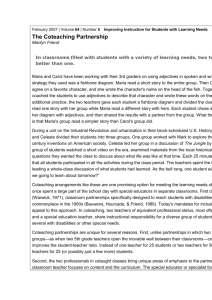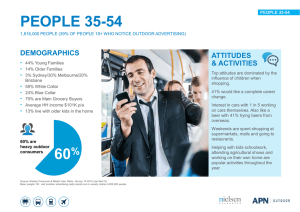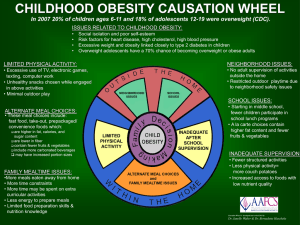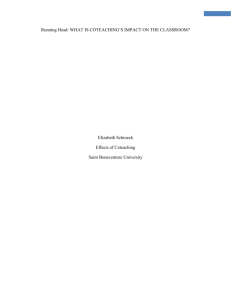New approaches to Key Stage 2/3 science teaching in the outdoor
advertisement
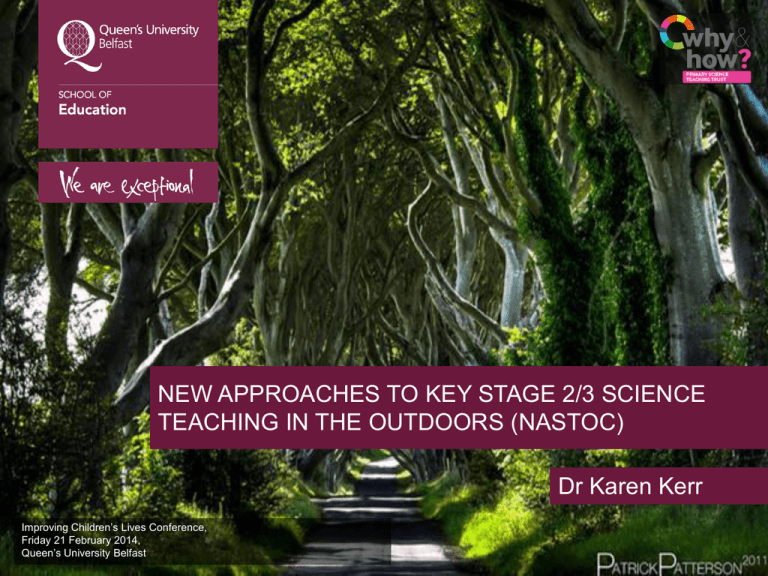
NEW APPROACHES TO KEY STAGE 2/3 SCIENCE TEACHING IN THE OUTDOORS (NASTOC) Dr Karen Kerr Improving Children’s Lives Conference, Friday 21 February 2014, Queen’s University Belfast WHY LEARN OUTDOORS? • Children enjoy and remember outdoor work (Dillon et al, 2006) • Learning experiences conducted in the outdoors were more likely to have a cognitive impact than those conducted in classrooms (Eaton, 2000) • Positive impacts on children’s attitudes to the environment (Mittelstaedt, Sanker and Vanderveer (1999) PROJECT OUTCOMES 1. Teachers who are enthusiastic in teaching science in an outdoor classroom to promote links between ‘transition’ teachers and their schools via coteaching 2. Promotion of outdoor approaches to teaching science so that ‘transition’ teachers will enjoy science teaching more and see the benefits of teaching science in this way. 3. Increase in pupils’ engagement and enjoyment of science in the outdoor classroom and more positive attitudes to transition and secondary school science. 4. Long term and sustainable positive change to the practice of science teaching in the outdoors. 5. Development and piloting of classroom materials to support the teaching of science in the transition phase, in the outdoors. 6. Improved leadership and management of teaching science in the outdoors. HOW WAS THE PROJECT DESIGNED? • A sound framework developed by a wealth of earlier CPD programmes(Kerr, 2010; Murphy and Beggs, 2010; Murphy and Scantlebury, 2010) - Co-planning/co-construction, coteaching and co-evaluating - Used a blended CPD approach of workshops and in-class support • This programme addressed all the core criteria from a review of effective CPD (Kerr, 2010): active participation, focusing on the needs of specific teachers and pupils, working together, reflection, presentation of work and a long term/on-going element • Distinctiveness of this project: - Addressed transition issues as well issues with teaching and learning in the outdoors EVALUATION STRATEGY Project outcomes Teachers who are enthusiastic in teaching science in an outdoor classroom to promote links between ‘transition’ teachers and their schools via coteaching Sources of evaluation evidence • Attitude audit (pre and post workshops and classroom trialling) • Reflective diaries completed during classroom sessions • Teacher interviews Promotion of outdoor approaches to teaching science so that ‘transition’ teachers will enjoy science teaching more and see the benefits of teaching science in this way. Increase in pupils’ engagement and enjoyment of science in the outdoor classroom and more positive attitudes to transition and secondary school science. • Focus groups with children • Children's Pre and post online questionnaire Long term and sustainable positive change to the practice of science teaching in the outdoors. • Teacher interviews (Predicted impact) • Longer term impact followed up with teachers in new school year • The production and piloting of new teaching materials to be used in the implementation of the revised science curriculum • Video based evidence of the piloting of new teaching materials in the classroom • Interviews with teachers • School development documentation Development and piloting of classroom materials to support the teaching of science in the transition phase, in the outdoors. Improved leadership and management of teaching science in the outdoors. CHILDREN’S QUESTIONNAIRE The children’s online questionnaire included the following sections, adapted from well-known work in the area: – Children’s attitudes to school science (Kerr, 2008) – Children’s perceptions of their independence and teamwork. This section was adapted from Amos and Reiss (2011) from their work on the London Challenge Residential Experience, LCRE). – Children’s attitudes to learning science outside. This section was also adapted from Amos and Reiss (2011). – Children’s views on sustainability adapted from Manoli, C., Johnson, B., & Dunlap’s (2007) New Ecological Paradigm scale for children. – Children’s attitudes towards transition – a newly developed measure based on a previous questionnaire in relation to attitudes towards the Northern Ireland Revised Curriculum (used for the NAPSTA, NASTA projects). TEACHERS’ ENTHUSIASM, ENJOYMENT & TRANSITION LINKS 1. Enthusiastic about coteaching science in the outdoor classroom - promoted transition stage links between their schools 2. Raised their awareness of the level and content of science in the primary school and/or post-primary school - scaling back of science in the primary curriculum - this project bridged the gap and raised awareness 3. Able to share ideas and practice - confidence grew, access to resources and equipment - made use of the science expertise of the post-primary teacher 4. ‘Up-fronting’ outdoor learning as a vital part of teaching and learning PUPIL ENGAGEMENT AND ENJOYMENT “I really enjoyed it because you get to be outside and you don’t have to move around with the teacher and it’s not really like the teacher showing you…it’s really fun, you’re exploring, you’re kind of like an investigator with trees.” (post-primary student) The percentage of positive responses for the 'attitudes towards school science' items 100 83 85 % 'yes' responses “You get to see things in real life and it makes you understand it more because inside they can only tell you what it looks like…you can see it, you can touch it, feel it and you understand more about it.” (primary student) 80 83 77 69 62 60 40 52 55 33 38 Pre Post 20 0 like science all children like solving more science join a science lessons should have problems to in school after school to learn do with club science science “The outdoor science that we are doing the research for has interested me more in science because I didn’t know science could be that fun with your friends and finding out about new things” (primary student) PUPIL ATTITUDES TO TRANSITION “I was quite scared…it made me more confident, I have nothing to worry about, you might not be in the same class as your friends but you can make new friends.” (primary student) “Especially cause we were telling them it…it’s not as if an adult was telling them it and they wouldn’t be listening cause it would have years ago they went through school.” (post-primary student) “I thought it would have been a bit scary because when you come to year 8 you have no one to talk to except for your friends from here but now I’ve realised that the year 8s are having a really good time and they are all talking with each other, they are all friends so it’s reassuring me a bit.” (primary student) “Remember we didn’t do this last year and we didn’t know how many people would be in the school, we didn’t know if it would be a big crowd or whatever but they know it’s going to be a big crowd and how many people are in the corridors and that.” (post-primary student) WE NEED TO LOOK AFTER OUR ENVIRONMENT!!!! The percentage of positive responses for the 'sustainability' items (‘Human Exemptionalism’ and ‘Rights of Nature’) People are clever enough to keep from ruining the Earth completely 57 53 Nature is strong enough to handle the damage caused by our modern lifestyles 43 * 32 Pre Post Plants and animals are mainly on Earth to be used by people 35 29 People were created to rule over nature 23 0 * represents a significant difference at p<0.05 “…there is a lot of litter which shouldn’t be there. Obviously people throw it over the wall and don’t think about what is happening but there is a lot of creature dying from it.” (primary student) 20 28 * 40 60 80 100 % agreement Percentage of positive responses for the 'sustainability' items (‘Eco-crisis’) When people mess with nature it often ends up with bad results 84 87 73 People are treating nature very badly 80 Pre 80 81 People must live in balance with nature to survive To make sure everyone can live well, industries and jobs across the world need to grow steadily, not too… Post 62 64 41 Soon there will be too many people for the Earth to support 48 0 20 40 60 % agreement 80 100 LONG TERM AND SUSTAINABLE CHANGE • PGCE course • Developed network, established collaborations, outdoor experts • Interest and enthusiasm – transition project to continue • Changes to teaching and learning practices, whole school science curriculum, development of the outdoor science/learning throughout schools. CLASSROOM MATERIALS - RECORDING IN THE ENVIRONMENT Teacher workshops CLASSROOM MATERIALS - RECORDING IN THE ENVIRONMENT A bug project… Design and make Bug traps Set Bug traps Look at Bugs Collect Bugs CLASSROOM MATERIALS - RECORDING IN THE ENVIRONMENT A bug project… Look at Bugs Tree beating CLASSROOM MATERIALS - RECORDING IN THE ENVIRONMENT A bug project… Make Bug hotels! CLASSROOM MATERIALS - RECORDING IN THE ENVIRONMENT A tree project… Young and old! Meaning of ‘Ancient’ ‘Ancient tree’ spotting Plant a tree Make an ancient tree CLASSROOM MATERIALS - RECORDING IN THE ENVIRONMENT A pond project… Intro to Creatures who live in ponds Practice with nets during play Look at the creatures Pond dipping RECOMMENDATIONS & CONCLUSIONS Conclusions: • • • The NASTOC project achieved all six outcomes and, therefore, evidenced a real proof of concept for the approach of using a coteaching model and a blended CPD approach to effectively improve and develop teaching and learning in the outdoor classroom. Teachers and children were excited, enthusiastic and motivated by the benefits to their learning and to easing transition between primary and post-primary school. Importance of ‘up-fronting’ outdoor learning and the wide and varied benefits for children by learning in this way! Children’s recommendations: • • • • • • More time, more days to get to know each other More activities in the outdoors as part of this project again – more time Going outside more during the school year, as part of the normal curriculum, to learn science Doing more of their practical work outside during the school year Separate outdoor learning lessons in their timetables An after school club for learning science outdoors WHERE NOW? Continued funding from the Primary Science Teaching Trust (PSTT) as part of the NI Hub to expand the transition project: - Nursery primary transition - Primary post-primary transition - Development of area based clusters Large grant to expand the work of the Open Air Laboratories (OPAL) to Northern Ireland: - Observing and recording in the environment with schools - Teacher/community worker training - National committee - Accredited courses REFERENCES • • • • • • • • • Amos, R. and Reiss, M. (2011) 'The Benefits of Residential Fieldwork for School Science: Insights from a five-year initiative for inner-city students in the UK', International Journal of Science Education, online 1 (iFirst), 1-27. Dillon, J., Rickinson, M., Teamey, K., Morris, M., Young Choi, M., Sanders, D. And Benefield, P. (2006) The value of outdoor learning: evidence from research in the UK and elsewhere. School Science Review, 87(320), 107-111. Eaton, D. (2000) Cognitive and affective learning in outdoor education. Dissertation Abstracts International – Section A: Humanities and Social Sciences, 60, 10-A, 3595. Kerr, K. (2008) "I don't like splashing in the water" : children's voices in primary science. Unpublished doctoral thesis. Belfast: Queen’s University. Kerr, K. (2010) "It Certainly Taught Us How to Change Our Minds on Teaching Science": Coteaching in Continuing Professional Development in Murphy, C. and Scantlebury, K. Coteaching in International Contexts Research and Practice. Springer. Manoli, C., Johnson, B., & Dunlap, R.E. (2007) Assessing children’s environmental world views: Modifying and validating the new Ecological Paradigm scale for use with children. The Journal of Environmental Education, 38(4), p. 3-13. Mittelstaedt, R., Sanker, L. and Vanderveer, B. (1999) Impact of a week-long experiential education program on environmental attitude and awareness. Journal of Experiential Education, 22(3), 138-148. Murphy, C. and Beggs, J. (2010) A Five-year Systematic Study of Coteaching Science in 120 Primary Schools: Coteaching in Continuing Professional Development in Murphy, C. and Scantlebury, K. Coteaching in International Contexts Research and Practice. Springer. Murphy, C. and Scantlebury, K. (2010) introduction to Coteaching: Coteaching in Continuing Professional Development in Murphy, C. and Scantlebury, K. Coteaching in International Contexts Research and Practice. Springer. CONTACT DETAILS Dr Karen Kerr School of Education Queen’s University Belfast k.kerr@qub.ac.uk
